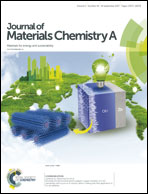Poly(5-alkyl-thieno[3,4-c]pyrrole-4,6-dione): a study of π-conjugated redox polymers as anode materials in lithium-ion batteries†
Abstract
Organic polymers have been investigated as active electrode materials in the past few years and although materials with high energy density and tunable redox potential have been developed, their dissolution into the electrolyte and their low electronic conductivity compromised their use in rechargeable batteries. To overcome these drawbacks, seven n-type π-conjugated redox polymers based on 5-alkyl-thieno[3,4-c]pyrrole-4,6-dione have been developed for anode materials of rechargeable batteries. The role of the carbonyl group on the electrochemical activity of these polymers has been demonstrated and the effect of the alkyl chain and the comonomer unit on their electrochemical performance. The redox potential of the polymer has been shown to vary over a range of 400 mV and a polymer with a suitable redox potential of 1.55 V vs. Li/Li+ for an anode of a lithium-ion battery has been found.
![Graphical abstract: Poly(5-alkyl-thieno[3,4-c]pyrrole-4,6-dione): a study of π-conjugated redox polymers as anode materials in lithium-ion batteries](/en/Image/Get?imageInfo.ImageType=GA&imageInfo.ImageIdentifier.ManuscriptID=C7TA03786D&imageInfo.ImageIdentifier.Year=2017)


 Please wait while we load your content...
Please wait while we load your content...